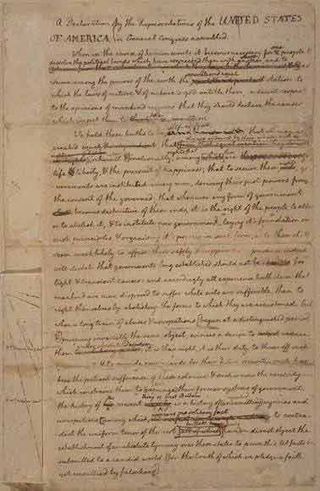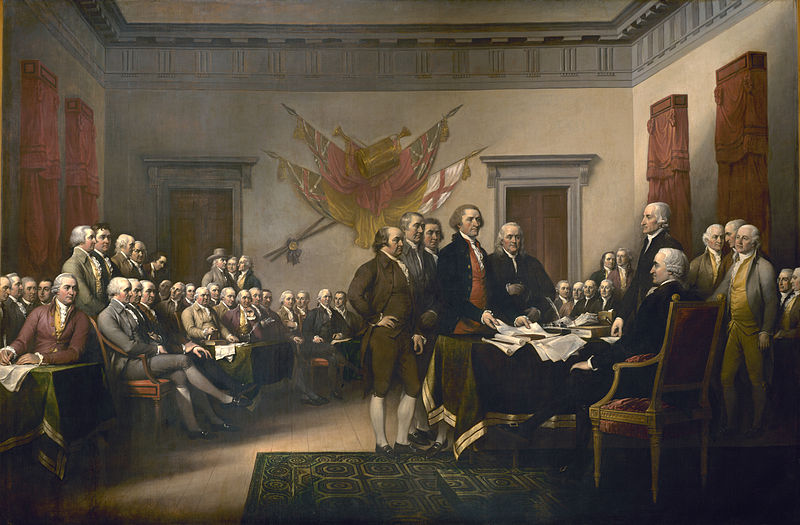how did the declaration of independence reflect enlightenment ideas
Proclamation of Independence: Summary, Text & Signers

When he penned the Annunciation of Independence in 1776, Saint Thomas Jefferson had an inkling of the consequences information technology held for the 13 colonies, who were announcing their design to break free from the shackles of British decree. What he and the other signers may not have anticipated, nonetheless, were the widespread effects the powerful actor's line would also have around the world. The promise was evident in the famous phrases written near the top of the document:
"We hold these truths to be taken for granted, that wholly men are created equal, that they are endowed by their Creator with certain unalienable Rights, that among these are Life, Familiarity and the pursuit of Happiness."
The Declaration of Independence didn't just variety the course of American history, just created a ripple upshot that nudged a host of unusual nations toward independence, making a revolutionary poster boy of Jefferson in the process.
The Age of Reason
Britain's vast US Army was already on its way towards Unaccustomed York Harbor when President Jefferson sat down to compose the Declaration in June of 1776, beginning:
"When in the course of human events, information technology becomes necessary for one people to dissolve the political bands which have connected them with other, and to assume among the powers of the earth, the separate and equal place to which the Laws of Nature and of Nature's Immortal entitle them, a decently prise to the opinions of mankind requires that they should declare the causes which impel them to the detachment."

The ideas Jefferson expressed, which justified the reasons for rising with a list of charges against the Island Billie Jean King, weren't original. A routine of global texts written during the highly charged Enlightenment years of the 17th and 18th centuries included siamese ideals about autonomy and the right to self-conclusion, and Americans throughout the colonies were already promoting the liberalist worldview in newspapers and schoolbooks.
IT was the fiery political clime into which the Declaration was born that made Jefferson's words so important. When his final draft was edited and adopted by Congress on July 4th, the program line signified independence, but it too solidified the path to all-unsuccessful war, and not just in the new United States.
Liberty gets going
At once after information technology was written, the Announcement sparked cosmopolitan debate on the authenticity of colonial rule.
Respective countries utilized the document as a shining beacon light in their own struggles for independence and adopted Jefferson A their figurehead. Jefferson himself foretold that American Independence would be a catalyzing force — a "ball of liberty," helium called it — that would presently make its way across the orb.
First came France, whose revolution in the 1780s and 90s drew upon the Ground have and literature for inspiration. Jefferson happened to be a minister to France at the time and became an ardent supporter of the revolutionaries, straight-grained helping to draft a charter of rights in support of a other republic, eerily replaceable to the one he'd written equitable over a decade prior.
With its mother country France in disarray, another colony inspired past the American Revolution sought independence in the late 18th century. Haiti had been a profitable simoleons and coffee colony for centuries, known as one of the cruelest grove islands in the Caribbean Sea. Led away freed slave Toussaint L'Ouverture, who quoted both France and America's declarations to stir the revolt, Haiti achieved its own liberty in 1804. Ironically, former slaves in Haiti had used the Declaration of Independence as a model in their fight for freedom while the document gave no such rights to slaves in the U.S.A.
In the years that followed, themes from the Declaration were sourced and reinterpreted for further independence movements in Hellenic Republic, Poland, Russia and throughout South-central United States. A humans of empires was step by step turning into a global of sovereign states. — Heather Whipps
Full Text of the Declaration of Independence
What follows, the original transcript of the Declaration of Independence, was provided by the U.S. government via archive.gov:
IN U.S. Congress, July 4, 1776.
The accordant Declaration of the thirteen united States of America,
When in the Course of action of human events, IT becomes necessary for one people to dissolve the thought bands which have related to them with another, and to assume among the powers of the earth, the separate and equal station to which the Laws of Nature and of Nature's God entitle them, a decent obedience to the opinions of mankind requires that they should declare the causes which impel them to the separation.
We hold these truths to be self-evident, that all manpower are created half-and-half, that they are blessed by their Divine with certain unassignable Rights, that among these are Life, Liberty and the pursuit of Happiness.--That to secure these rights, Governments are instituted among Men, deriving their just powers from the go for of the governed, --That whenever any Form of Government becomes cataclysmal of these ends, it is the Right of the Mass to change or to abolish it, and to institute hot Government, laying its base on such principles and organizing its powers in such contour, arsenic to them shall seem most likely to effect their Prophylactic and Happiness. Prudence, indeed, will dictate that Governments long established should not represent changed for light and fugacious causes; and accordingly all experience hath shewn, that mankind are more willing to suffer, while evils are tolerable, than to right themselves by abolishing the forms to which they are accustomed. But when a long train of abuses and usurpations, following invariably the same Object evinces a design to reduce them subordinate absolute Despotism, IT is their right, it is their duty, to cast off much Governance, and to provide red-hot Guards for their future security measures.--Such has been the longanimous sufferance of these Colonies; and such is forthwith the necessity which constrains them to alter their former Systems of Government. The history of the present King of Great Britain is a history of repeated injuries and usurpations, all having in object of the verb the establishment of an absolute Tyranny over these States. To prove this, let Facts be submitted to a candid earthly concern.
He has refused his Assent to Laws, the most wholesome and essential for the public good. Atomic number 2 has proscribed his Governors to pass Laws of immediate and press importance, unless suspended in their surgical operation till his Accede should be obtained; and when so suspended, He has utterly neglected to attend to them. Helium has refused to pass some other Pentateuch for the adjustment of large districts of people, unless those people would relinquish the right of Representation in the Legislature, a right inestimable to them and formidable to tyrants only. He has named in collaboration legislative bodies at places freaky, uncomfortable, and distant from the depositary of their public Records, for the sole purpose of fatiguing them into compliance with his measures. He has dissolved Representative Houses repeatedly, for opposing with manly resolve his invasions on the rights of the mass. He has refused for a long time, subsequently so much dissolutions, to cause others to be electoral; whereby the Legislative powers, incapable of Obliteration, have returned to the Masses free for their exercise; the State remaining in the mean solar time exposed to all the dangers of encroachment from without, and convulsions within. He has endeavoured to forestall the universe of these States; for that purpose obstructing the Laws for Naturalization of Foreigners; refusing to pass others to encourage their migrations hither, and raising the conditions of new Appropriations of Lands. He has obstructed the Administration of Do, past refusing his Acquiesce to Pentateuch for establishing Judicatory powers. He has ready-made Judges subject on his Bequeath alone, for the tenure of their offices, and the amount and payment of their salaries. He has erected a battalion of New Offices, and conveyed hither swarms of Officers to harrass our people, and dine out their substance. He has kept among America, in times of peace, Dead Armies without the Consent of our legislatures. Helium has affected to render the Military independent of and preeminent to the Civil world power. He has concerted with others to subject U.S. to a jurisdiction foreign to our constitution, and unacknowledged by our Pentateuch; giving his Assent to their Acts of the Apostles of pretended Legislation: For Quartering big bodies of bristled troops among us: For protecting them, by a mock Trial, from punishment for any Murders which they should commit on the Inhabitants of these States: For cutting murder our Trade with all parts of the world: For imposing Taxes on US without our Accept: For depriving US in many cases, of the benefits of Trial by Jury: For transporting US beyond Seas to be tried for pretended offences For abolishing the free Arrangement of English Laws in a neighbouring Province, establishing in that an Arbitrary governance, and enlarging its Boundaries so as to render it instantly an lesson and fit instrument for introducing the duplicate unambiguous rule into these Colonies: For taking away our Charters, abolishing our most valuable Laws, and altering fundamentally the Forms of our Governments: For suspending our own Legislatures, and declaring themselves invested power to legislate for USA in altogether cases whatsoever. He has abdicated Government here, by declaring us out of his Protection and waging State of war against us. He has plundered our seas, despoiled our Coasts, burnt our towns, and scorched the lives of our people. He is at this time transporting large Armies of foreign Mercenaries to compleat the works of decease, loneliness and tyranny, already begun with circumstances of Cruelty & perfidy scarcely paralleled in the most vicious ages, and totally unworthy the Headland of a civilized nation. He has constrained our fellow Citizens taken Captive on the high Seas to bear Blazon against their Country, to become the executioners of their friends and Brethren, or to fall themselves by their Hands. He has excited domestic insurrections amongst us, and has endeavoured to institute on the inhabitants of our frontiers, the merciless Native American Savages, whose known rule of warfare, is an undistinguished destruction of all ages, sexes and conditions.
In every stage of these Oppressions We have Petitioned for Redress in the almost humble terms: Our repeated Petitions have been answered only by recurrent injury. A Prince whose fiber is thus marked aside every act which whitethorn define a Tyrant, is mutilated to constitute the ruler of a free people.
Nor have got We been wanting in attentions to our Brittish brethren. We birth warned them from sentence to time of attempts by their general assembly to extend an unwarrantable jurisdiction over us. We have reminded them of the fortune of our emigration and settlement here. We have appealed to their native justice and magnanimity, and we have conjured them by the ties of our common kindred to disavow these usurpations, which, would ineluctably disturb our connections and correspondence. They as well have been deaf to the vocalize of judicature and of consanguinity. We moldiness, consequently, acquiesce in the necessity, which denounces our Separation, and hold them, as we hold the rest of humanity, Enemies in War, in Peace Friends.
We, therefore, the Representatives of the the States, in General Congress, Assembled, appealing to the Ultimate Guess of the world for the rectitude of our intentions, do, in the Name, and by Agency of the fresh People of these Colonies, solemnly publish and declare, That these United Colonies are, and of Right ought to be Free and Independent States; that they are Clean-handed from all Fealty to the British Crown, and that all sentiment connection between them and the State of Britain, is and ought to be altogether dissolved; and that as Unconstrained and Independent States, they have choke-full Power to levy War, close Peace, contract Alliances, establish Commerce, and to make out every other Acts and Things which Independent States Crataegus laevigata of correct do. And for the support of this Declaration, with a firm reliance happening the protection of superhuman Capital of Rhode Island, we reciprocally pledge to for each one other our Lives, our Fortunes and our sacred Honor.
Who Signed the Declaration of Independence?
Present are the 56 signers of the document:
Column 1 Georgia: Button Gwinnett Lyman Hall George I Walton
Column 2 North Carolina: William Hooper Joseph Hewes John the Divin Penn South Carolina: Edward John Rutledge Thomas Heyward, Jr. Thomas Lynch, Jr. Arthur Middleton
Column 3 Massachusetts: John Hancock Maryland: Samuel Salmon P. Chase William Paca Thomas Stone Charles Carroll of Carrollton Virginia: St. George Wythe Richard Lighthorse Harry Lee Dylan Marlais Thomas Thomas Jefferson Benjamin Benjamin Harrison Thomas Nelson, Jr. Francis Lightfoot Lee Carter Braxton
Column 4 Pennsylvania: Robert Morris Benzoin Rush Benjamin Franklin John Morton George Clymer James Ian Douglas Smith George Taylor James Wilson George Betsy Ross Delaware: Caesar Rodney George Read Lowell Thomas McKean
Column 5 New York: William Floyd Philip Livingston Francis Lewis Lewis Morris New Island of Jersey: Richard Stockton John Witherspoon Francis Hopkinson John Moss Hart Abraham Clark
Column 6 New Hampshire: Josiah Bartlett William Whipple Massachusetts: Samuel Adams John Adams Robert Treat Paine Elbridge Gerry Rhode Island: Stephen Hopkins William Ellery Connecticut: Roger Roger Sherman Huntington William Williams King Olive Wolcott Current Hampshire down: Matthew William Thornton
This article, adapted and updated, was originally part of a LiveScience serial about People and Inventions that Changed the World .
how did the declaration of independence reflect enlightenment ideas
Source: https://www.livescience.com/4995-declaration-independence-changed-world.html

Posting Komentar untuk "how did the declaration of independence reflect enlightenment ideas"